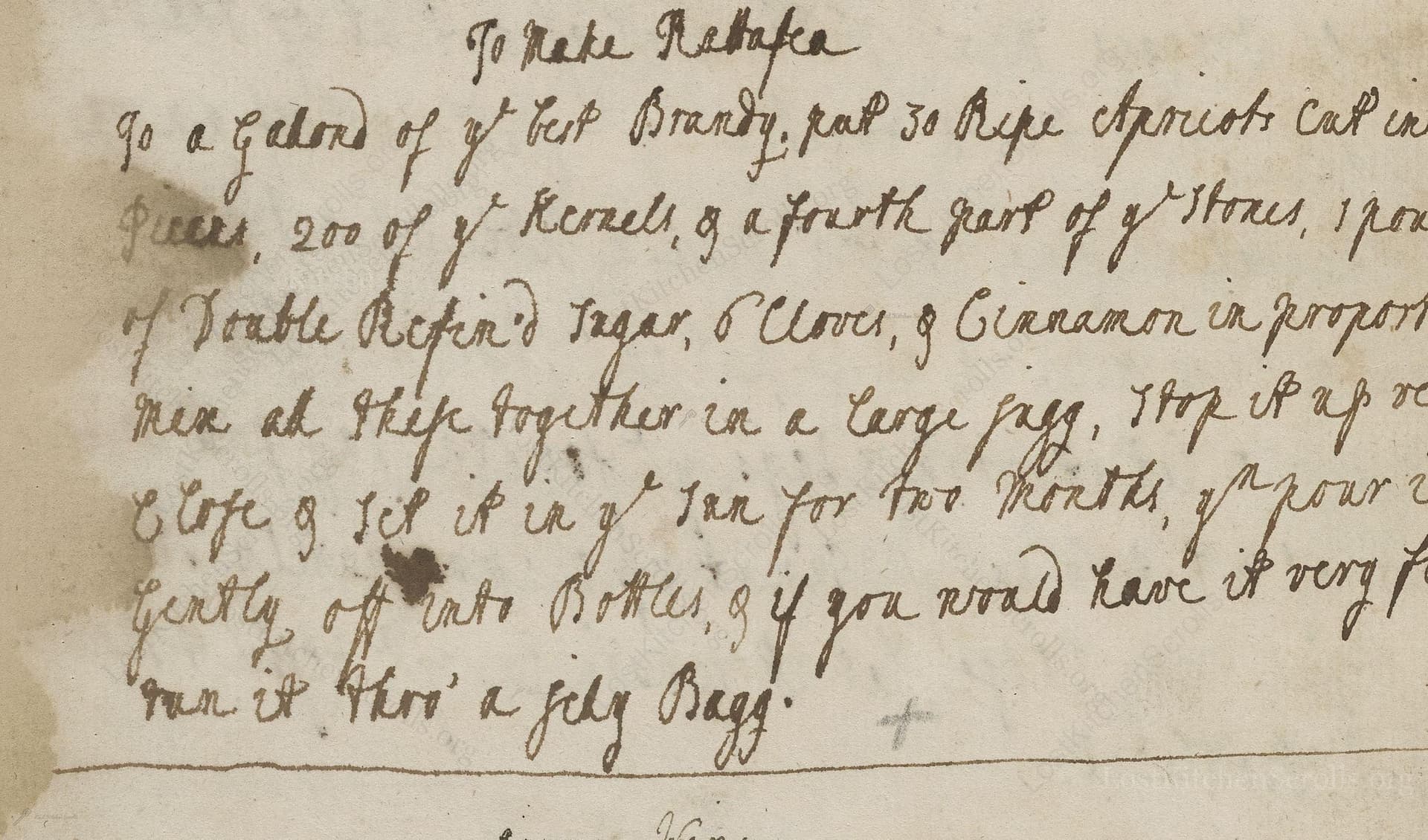To Make Ratafia
From the treasured pages of Receipt book of Elizabeth Smith
Written by Elizabeth Smith

To Make Ratafia
"Go a gallon of ye Best Brandy, put 30 Ripe Apricots Cut into pieces, 200 of ye Kernels, & a fourth part of ye Stores, 1 pound of double Refin'd Sugar, & Cloves, & Cinnamon in proportion, Mix all these together in a Large Jug. Stop it up very Close. & Set it in ye Sun for two Months. ye pour it gently off into Bottles, & if you would have it very fine you- run it thro' a Jelly Bagg."
Note on the Original Text
The original recipe is written in informal, abbreviated 18th-century English, full of period spellings (such as 'ye' for 'the' and 'Stores' meaning provisions—possibly nuts or related ingredients). Quantities are large and precise ('a gallon', '30 ripe apricots'), reflecting a household making large batches for storage. Recipes of this era rely on ingredient familiarity and basic kitchen skills, with minimal step-by-step instruction. Preservation methods (like sealing tightly and sun-steeping) were essential, given the lack of refrigeration. Spelling and terminologies reflect regional and temporal quirks in manuscript cookery collections.

Title
Receipt book of Elizabeth Smith (1775)
You can also click the book image above to peruse the original tome
Writer
Elizabeth Smith
Era
1775
Publisher
Unknown
Background
Step into the refined kitchens of the late 18th century with Elizabeth Smith, whose culinary wisdom offers a charming taste of Georgian elegance and time-honored recipes to delight any palate.
Kindly made available by
Folger Shakespeare Library
This recipe dates from the late 18th century, appearing in the handwritten collection of Elizabeth Smith. Ratafia was a popular homemade liqueur or cordial, flavored with fruits, nuts, and spices, and enjoyed both for pleasure and as a tonic. Such recipes were often handed down through families, carefully copied into personal cookery manuscripts. At the time, ratafia could refer to a variety of infused drinks, many of which served as early forms of digestifs or flavored liquors, enjoyed by the gentry and emerging middle classes. The inclusion of both fruit and kernel reflects an era’s taste for aromatic, complex cordials, often believed to have healthful properties.

Households would use large glazed earthenware or glass jars or jugs, sometimes with cork or wax-sealed stoppers, to steep the ingredients. The finished ratafia was carefully decanted and then run through a 'jelly bag'—a cone-shaped cloth, usually of fine muslin—to clarify it before bottling. Bottles were typically sealed with cork and wax. Spoons or wooden mashers helped mix and break up the fruit, while ladles or funnels aided with bottling.
Prep Time
35 mins
Cook Time
0 mins
Servings
30
We've done our best to adapt this historical recipe for modern kitchens, but some details may still need refinement. We warmly welcome feedback from fellow cooks and culinary historians — your insights support the entire community!
Ingredients
- 1 gallon (4 quarts) brandy (best quality)
- 30 ripe apricots (approx. 3.5–4.5 lbs)
- 200 apricot kernels (or substitute with bitter almonds, about 7 oz)
- 14 oz blanched almonds (if interpreting 'stores' as almonds, or optional)
- 1 lb double-refined sugar (superfine caster sugar)
- 6 whole cloves
- 2 cinnamon sticks
Instructions
- To recreate this summery 18th-century Ratafia, pour 1 gallon (4 quarts) of the best-quality brandy into a large, well-sealed glass jar.
- Slice 30 ripe apricots (about 3.5–4.5 pounds) and add them to the jar, along with the kernels from the apricots (or substitute with 7 ounces of apricot or bitter almond kernels).
- Mix in about 9 ounces of blanched bitter almonds if 'stores' refers to them, or use a quarter of the apricot weight in nuts as an interpretive measure (roughly 14 ounces).
- Stir in 1 pound of double-refined sugar (superfine granulated sugar works), and add a few whole cloves (about 6) and one or two cinnamon sticks, to taste.
- Seal the jug tightly and set it in a sunny spot, such as a windowsill, for two months—shaking it gently once every week.
- After two months, carefully decant the liquid from the solids.
- For extra clarity, strain through a jelly bag or a fine muslin cloth, then bottle your ratafia.
- Store in cool, dark place and enjoy as a cordial or dessert liqueur.
Estimated Calories
170 per serving
Cooking Estimates
This recipe takes just a short time to prepare the ingredients and combine them in a jar. There is no cooking involved—just infusing for two months. The estimated calories per serving are based on a typical cordial serving size. This recipe will yield about 30 small servings.
As noted above, we have made our best effort to translate and adapt this historical recipe for modern kitchens, taking into account ingredients nowadays, cooking techniques, measurements, and so on. However, historical recipes often contain assumptions that require interpretation.
We'd love for anyone to help improve these adaptations. Community contributions are highly welcome. If you have suggestions, corrections, or cooking tips based on your experience with this recipe, please share them below.
Join the Discussion
Rate This Recipe
Dietary Preference
Main Ingredients
Culinary Technique

Den Bockfisch In Einer Fleisch Suppen Zu Kochen
This recipe hails from a German manuscript cookbook compiled in 1696, a time whe...

Die Grieß Nudlen Zumachen
This recipe comes from a rather mysterious manuscript cookbook, penned anonymous...

Ein Boudain
This recipe comes from an anonymous German-language manuscript cookbook from 169...

Ein Gesaltzen Citroni
This recipe, dating from 1696, comes from an extensive anonymous German cookbook...
Browse our complete collection of time-honored recipes



